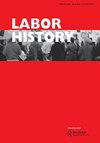The birth of Soviet workers-dissidents
IF 0.7
4区 管理学
Q1 HISTORY
引用次数: 0
Abstract
ABSTRACT This article deals with the birth of workers-dissidents in the USSR in the late 1970s, through materials of the Radio Free Europe-Radio Liberty (RFE-RL) Research Institute held at the Budapest Open Society Archive. Soviet dissidents are usually regarded as intellectuals. However, beginning from the late 1970s, a small phenomenon of labour dissent arose within the Soviet Union, which also tried to found independent trade unions. These workers-dissidents had similarities as well as differences from intellectual dissidents. While intellectuals focused more on individual, civil and political rights, labour dissidents focused on socioeconomic rights. Contrary to what one may believe, the birth of this phenomenon was reported in relative detail by the British and American press. Soviet labour dissent was an important discursive field in the late Cold War. Anti-Communist Western trade unions and political parties mentioned Soviet repression against workers-dissident to emphasise one basic contradiction of the Soviet system. However, many leftist political parties and trade unions also showed solidarity with Soviet labour dissidents, criticizing the same contradiction. With hindsight, these widespread reactions show that the USSR was becoming ideologically isolated, because even many Western Communists and Socialists were no longer prone to justify its antidemocratic and repressive methods.苏联异见工人的诞生
摘要本文通过布达佩斯开放社会档案馆举办的自由欧洲电台研究所的材料,讲述了20世纪70年代末苏联工人异见人士的诞生。苏联持不同政见者通常被视为知识分子。然而,从20世纪70年代末开始,苏联内部出现了一个小规模的劳工异议现象,苏联也试图建立独立的工会。这些持不同政见的工人与持不同政见者既有相似之处,也有不同之处。知识分子更关注个人、公民和政治权利,而劳工异见人士则关注社会经济权利。与人们可能相信的相反,英国和美国媒体对这一现象的产生进行了相对详细的报道。苏联劳工异议是冷战后期一个重要的话语领域。反共的西方工会和政党提到苏联对持不同政见的工人的镇压,以强调苏联制度的一个基本矛盾。然而,许多左翼政党和工会也声援苏联劳工异见人士,批评同样的矛盾。事后看来,这些广泛的反应表明,苏联在意识形态上正变得孤立,因为即使是许多西方共产党人和社会党人也不再倾向于为其反民主和镇压方法辩护。
本文章由计算机程序翻译,如有差异,请以英文原文为准。
求助全文
约1分钟内获得全文
求助全文
来源期刊

Labor History
Multiple-
CiteScore
1.00
自引率
28.60%
发文量
44
期刊介绍:
Labor History is the pre-eminent journal for historical scholarship on labor. It is thoroughly ecumenical in its approach and showcases the work of labor historians, industrial relations scholars, labor economists, political scientists, sociologists, social movement theorists, business scholars and all others who write about labor issues. Labor History is also committed to geographical and chronological breadth. It publishes work on labor in the US and all other areas of the world. It is concerned with questions of labor in every time period, from the eighteenth century to contemporary events. Labor History provides a forum for all labor scholars, thus helping to bind together a large but fragmented area of study. By embracing all disciplines, time frames and locales, Labor History is the flagship journal of the entire field. All research articles published in the journal have undergone rigorous peer review, based on initial editor screening and refereeing by at least two anonymous referees.
 求助内容:
求助内容: 应助结果提醒方式:
应助结果提醒方式:


